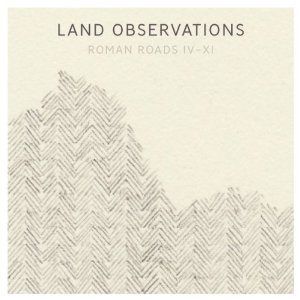James Brooks was originally one-third of Appliance, an under-rated and ahead of their time band who were among a clutch of acts, collectively marginalised under the post-rock umbrella, struggling against the suffocating Britpop consensus that dominated late-90s indie. They signed to Mute Records at the same time as kindred spirits Add N to (X) and Echoboy, and released a handful of fine albums and EPs, before going on indefinite hiatus in 2003. Since then, Brooks – who was the band’s guitarist and melodic architect – has largely returned to his practise as a visual artist, teaching at a college in Kent and exhibiting internationally, only occasionally engaging in musical projects.
Land Observations is different in that it’s the first musical venture that Brooks considers to be directly related to his visual art, which of late has been focussed on themes of mapping and cartography, the notion of boundaries and surface area, and the correlation between landscape and civilisation. These are weighty subjects to be sure, and ones that Brooks was enthused to discover that he could address as usefully through music as through his drawings and video installations. Following an initial EP – Roman Roads I-III, released on Enraptured last year- an inspirational evening at the Roundhouse Short Circuit festival led to Brooks resuming his working relationship with Mute Records; highly appropriate, since although Land Observations is a solo instrumental project for electric guitar and loop pedals, it’s still obviously very much inspired by electronic music in terms of construction and texture.
For those who still equate electronic music with "dance music" however, it might be worth noting that beats are conspicuous by their absence; instead, Land Observations is a meditative, highly conceptual project, intended to make the listener reconsider their relationship with the place in which they live, specifically by using the idea of Roman Roads. Brooks is fascinated by the way in which these roads simultaneously exist and don’t exist, or exist currently only as fragments or templates; the road beneath the road. An idea that disappears almost as soon as you are aware of it, dissolving around you even as you lock on to its seductive, linear groove.
Of course, as a long-term krautrock obsessive, Brooks is more aware than most of the significance of The Road in popular music. From the Beach Boys to Kraftwerk and beyond, the road variously symbolises progress, identity, rebellion, escape, forward motion into the future or capitulation to fate, journey and destination, the deal with the devil or the unlimited horizons of absolute freedom. Kraftwerk’s mighty Autobahn looms unavoidably over Roman Roads, but Brooks is comfortable, happy even in its shadow. Recorded in Berlin, the eight tracks here pay easy homage to their European forebears, but are unmistakably British in their overall sound and feel, nodding melodically to the traditional folk music of these isles, and existing at a slower pace, on a smaller scale, than the cross-continental constructions of Kraftwerk and company.
Beginning on Brooks’ own doorstep in London, ‘Before the Kingsland Road’ is motorik at a walking pace, a thrumming bass line anchoring single note specks of radiant guitar that pick out the sights as we go by; forward in motion, backward in time, the past superimposed on the present. The next four tracks however take us all the way to Rome itself: on ‘Aurelian Way’ melancholy guitars wrap around a steady, unobtrusive, percussive rattle, like that sound the old car used to make that you could never quite identify, while ‘Via Flaminia’ suggests Hank Marvin floating dreamlessly in space, arm in arm with Jason Pierce. The tense, clipped funk of ‘Appian Way’ is a model of restraint, building up layers of melody to simmering point but never quite bubbling over.
Back in Britain, ‘The Chester Road’ casts signal and echo in a never-ending, circular dance, while on ‘Portway’- the Roman road from Silchester to Old Sarum- a slow, light rain pings off the windscreen as a high tumulus move above the hills. These tracks would serve as an excellent alternative soundtrack to a certain kind of British road movie- as at home with Chris Petit’s 1979 Anglo-German downbeat masterpiece Radio On as with Powell and Pressburger’s elegiac A Canterbury Tale.
On closing piece, ‘Battle of Watling Street’, an e-bow simulates the whine of a hurdy-gurdy, and the whole conjures a slow tramp through mud and rain, commemorating the final defeat of Boudicca’s native rebels in southern England by the Roman troops in 61 AD. It’s the only track to explicitly reference an event, as well as a location; a decisive moment in which "civilisation" was firmly established on these shores, though by paradoxically barbarous means (Tacitus claims that over 80,000 men, women and children were slaughtered on this spot in a single day). As an anchor-point for the whole record, the track is an uncharacteristic dirge, a lament for those sacrificed by the builders of the roads; the roads that lie beneath the roads we now walk upon.


